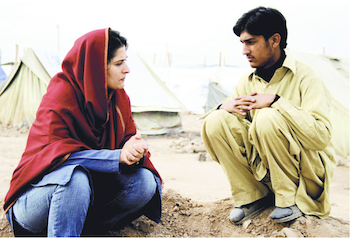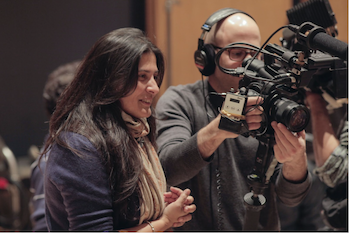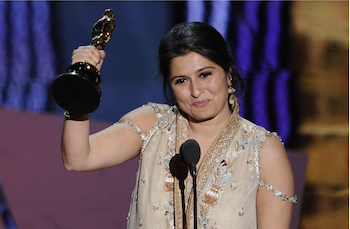
Sharmeen Obaid-Chinoy was born on November 12, 1978, in Karachi, Pakistan, into a family of Gujarati Muslims. Her mother, Saba Obaid, was a social worker, and her father, Sheikh Obaid, was a businessman. She has four younger sisters, including Mahjabeen Obaid and a younger brother. During her childhood, Sharmeen attended the Convent of Jesus and Mary, followed by Karachi Grammar School. Even though she achieved good grades, she was more interested in asking questions about the world rather than academics. Hence, her mother, Saba, encouraged her to put her questions into writing. By age 17, Obaid-Chinoy wrote for Dawn, a local English-language newspaper, and was an investigative reporter.
As she grew older, Obaid-Chinoy became increasingly bitter about the place of women in society. "I would often hear from my extended family, 'So-and-So couldn't finish her studies and was married off,'" she said in an interview with The New Yorker. "I realized that we accept things for women because that's just the way they are," she continued. "It made me question what my rights are and what I will be 'allowed' to do. And that became such a troubled word for me. Why should I be 'allowed' to do something? Shouldn't it just be taken for granted that I would be studying or going to work?" One afternoon, Sharmeen heard a female relative telling her mother, Saba, that she was unlucky to have so many daughters. Chinoy retorted that her mother was instead very fortunate, but she was quickly removed from the room.
However, Saba strongly supported her daughter's dreams and wishes. Sharmeen told The Guardian newspaper in 2007 that it was her motherwho was adamant that her five daughters should get the best possible education. Consequently, Chinoy went to the West for her higher education, majoring in economics and government at Smith College in Massachusetts. Sharmeen continued to write through her undergraduate years, including freelancing articles about Pakistani politics. By the time she enrolled at Stanford University, she was working as a reporter and producer for the now-defunct television production division of the New York Times. She obtained two master's degrees from Stanford University in International Policy Studies in 2003 and Communications in 2004.

"I'd been a print journalist for a while, and I felt that to make people understand what was happening in the Muslim world, you really had to make it visual. You can pick up a newspaper and read an article, and to some extent, you can imagine the place and the suffering. But when you hear it firsthand, I think it leaves a different kind of mark," says Chinoy. Her decision to switch to film was additionally influenced by the events of 9/11 and the subsequent American attacks on Afghanistan. That was when she "realized that people in the West really have no concept about life in Pakistan or in Afghanistan" and that it was necessary for things to be visual to increase awareness and understanding. In 2002, Chinoy launched her film career after returning to Pakistan. Her first fieldwork was filming Terror's Children, which proved a tremendous learning experience for her. The New York Times television division gave Obaid-Chinoy a two-week crash course on directing, using a camera, and working with sound. Then, the division sent her to Karachi in the summer of 2002. She shipped her first batch of tapes back to New York three weeks into filming, only to receive a frantic call informing her that there was no audio. She had to return and re-film the footage. Obaid-Chinoy spent ten weeks documenting the lives of eight children displaced by war in Afghanistan, following them as they resettled in Karachi's refugee camps, religious schools, and scavenger enclaves near rubbish dumps.
Chinoy filmed two award-winning films during her time at Stanford: Reinventing the Taliban?, which looks at the growth of Islamic fundamentalism in Pakistan, and On a Razor's Edge, which weighs the prospects for Pakistan's peace with India over the disputed territory of Kashmir. The latter was included in PBS's Frontline series "Stories from a Small Planet," which won an Overseas Press Club award in 2004. Over the next five years, she produced numerous broadcast reports, online videos, and written "Dispatches" from Pakistan. Her noteworthy films include 'Children of the Taliban,' 'The Lost Generation,' 'Afghanistan Unveiled,' '3 Bahadur,' 'Song of Lahore,' and the Academy Award-winning 'Saving Face' and 'A Girl in the River: The Price of Forgiveness.' Her films have been broadcast on several international networks, including PBS, CNN, Discovery Channel, Al Jazeera English, and Channel 4. Another significant achievement was meeting with Pakistan's Prime Minister, Nawaz Sharif, on February 15, 2016, to discuss closing legal loopholes that allow perpetrators of honor killings to escape justice. A week later, she held the first screening of 'A Girl in the River: The Price of Forgiveness' at the Prime Minister's Secretariat, where the need for legal reforms to prevent honor killings in Pakistan was emphasized.
Her visual storytelling has earned her multiple honors, including six Emmy Awards and the One World Media Award for Broadcast Journalist of the Year in 2007. She is the only female director awarded two Academy Awards by the age of 37. On receiving her second Academy Award, Obaid-Chinoy delivered a moving speech saying: "This is what happens when determined women get together... Last week, our Pakistani Prime Minister [Mian Muhammad Nawaz Sharif] has said that he will change the law of honor killing after watching this film. That is the power of film!" Her leadership extended beyond filmmaking when she became the first artist to co-chair the World Economic Forum, where she proudly represented both the art community and her country, Pakistan. In recognition of her efforts to uplift marginalized voices, she was included in Time magazine's 2012 list of the 100 most influential people. The Government of Pakistan has honored her with the Hilal-i-Imtiaz, the second-highest civilian honor in the country. Moreover, Canada has awarded her a Queen Elizabeth II Diamond Jubilee Medal.

Chinoy has also made impactful contributions outside of filmmaking. She has worked with refugees and marginalized individuals from Saudi Arabia to Syria, Timor Leste, and the Philippines. She also played a vital role in establishing the Citizens Archive of Pakistan, an organization dedicated to preserving Pakistan's cultural and social heritage through various initiatives. Additionally, she serves as the Ambassador for Blood Safety at Pakistan's national blood safety program.
Sharmeen married Fahd Kamal Chinoy in 2005 when she returned to Pakistan from Canada, where she was now residing. Kamal is an economics graduate from the University of Pennsylvania's Wharton School and the chief executive of the Karachi-based Pakistan Cables. They have a daughter, Amelia Chinoy, who is now "the reason why I make films," she said after her 2012 Oscar win. "I want the Pakistan that she inherits to be better than the one that we currently live in.
Sharmeen's work has exposed critical issues in Pakistan, addressing taboo subjects such as acid attacks and gender-based violence, propelling leaders to take action. She has played a critical role in effecting crucial change by amplifying the usually neglected or overlooked voices, using her platform to drive awareness and change. "By bringing the voices of ordinary people faced with extraordinary challenges to television screens around the world, I hope to affect change in one community at a time," says Sharmeen Obaid-Chinoy.
Why Did I Choose to Research Sharmeen Obaid-Chinoy?
I chose to research Sharmeen Obaid-Chinoy because of my deep passion for social justice, particularly in Pakistan, where social problems often escalate unchecked. Before Sharmeen's films, issues such as honor killings and acid attacks were rampant but rarely discussed or depicted in mainstream media. Her films bring these harsh realities to light, challenging societal norms and sparking meaningful conversations that are often silenced. She is incredibly inspirational, having become a powerful voice for the marginalized through her work, using her platform to drive awareness and change. Her dedication motivates me to continue pursuing my own passion for social justice and making a meaningful impact.
Works Cited
magazine, S. (n.d.). Focus on the Forgotten. STANFORD magazine. https://stanfordmag.org/contents/focus-on-the-forgotten
Sharmeen Obaid Chinoy. SOC Films. (n.d.). https://socfilms.com/sharmeen-obaid-chinoy/
Sharmeen Obaid-Chinoy. Women Make Movies. (n.d.). https://www.wmm.com/filmmaker/Sharmeen+Obaid-Chinoy/
Sharmeen Obaid-Chinoy. International Center for Journalists. (n.d.). https://www.icfj.org/about/profiles/sharmeen-obaid-chinoy
Sharmeen Obaid-Chinoy. Asia Society. (n.d.). https://asiasociety.org/asia-game-changers/sharmeen-obaid-chinoy
Gornall, J. (2021, June 16). Newsmaker: Sharmeen Obaid-Chinoy. The National. https://www.thenationalnews.com/arts-culture/newsmaker-sharmeen-obaid-chinoy-1.170178
This article was published on 7/9/2025